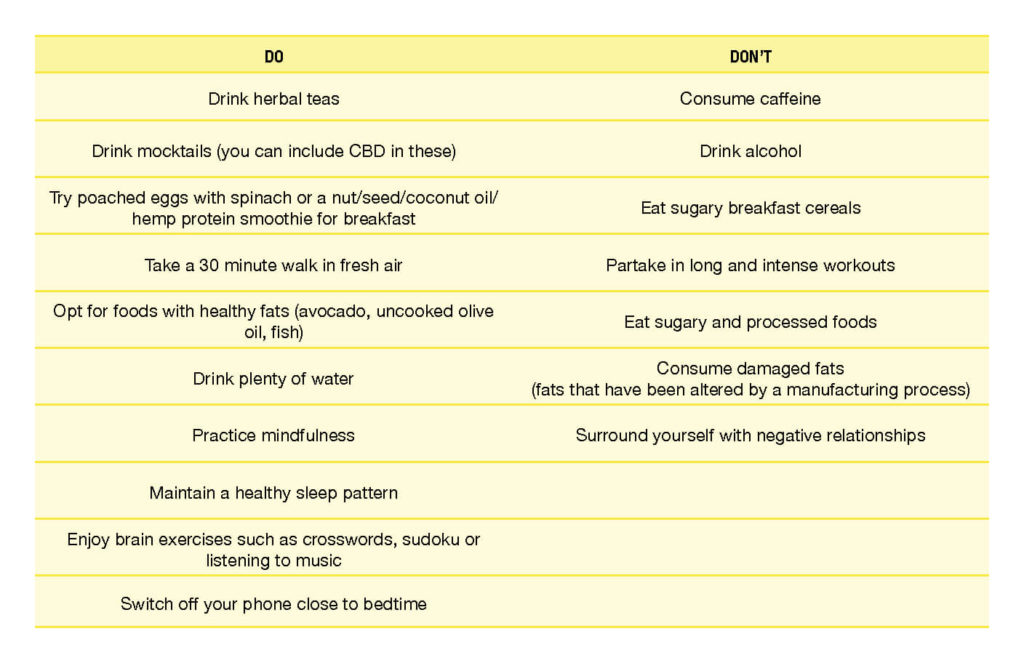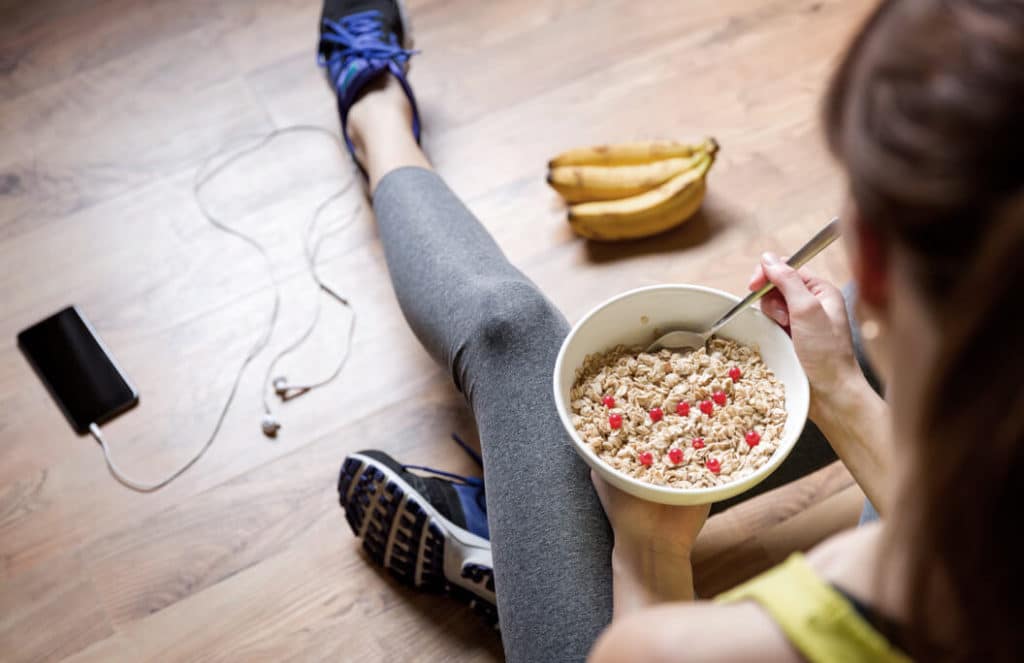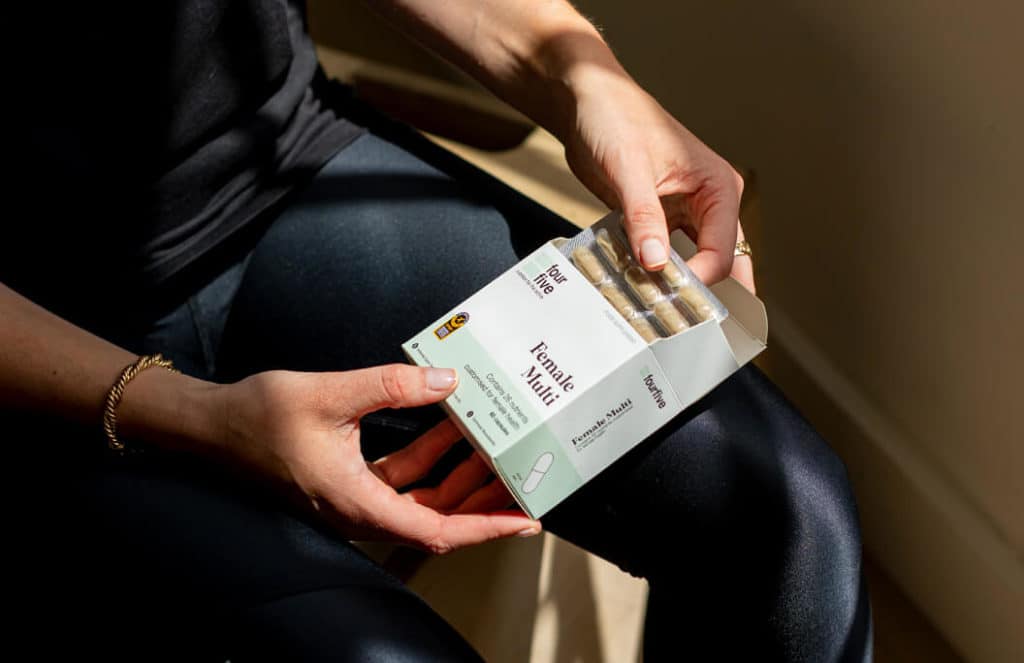Spotting the signs that your brain needs a little TLC is the first step to recharging your brain. After that, it’s a matter of maintaining a healthy diet, sleep pattern and mindfulness routine, amongst other things.
Dr. Elisabeth Philipps works in clinical neuroscience with a speciality in the endocannabinoid system. She’s passionate about using nutrition and lifestyle to better support the connections between our gut and brain, and the endocannabinoid system, as well as supporting a healthy gut microbiome, which contributes to all aspects of our physical and psychological health.
In this article she’ll be telling you everything you need to know about spotting the signs when your brain needs a recharge, with easy ways to support healthy brain function to help you feel your best.
How To Spot Your Brain Needs Some TLC
Firstly, what exactly is taking a toll on your brain? Stress, high sugar and low quality nutrient diets usually are usually the biggest culprits when it comes to negatively impacting our brain health.
There’s plenty of science that shows the stress hormone cortisol alters the brain’s structure while poorly controlled blood sugar and insulin response impacts brain function, specifically how brain cells ‘wire and fire’.
Eating lots of sugary foods on a regular basis leads to irregular blood sugar problems. Short term symptoms include brain fog, tiredness and low mood but this is just the start. Long term blood sugar and insulin problems not only increases the risk of developing type 2 diabetes but also damages the brain. Alzheimer’s disease is now called type 3 diabetes for a reason!
Warning signs include feeling tired when waking up for over three or more days, tiredness all together, irritability and generally feeling unfocussed for no reason.
Spotting these warning signs is the first step to improving your lifestyle to support your brain’s health.
The Do’s and Don’ts To Improving Your Brain Health

1. Maintain A Healthy Sleep Pattern

Stress impacts sleep quality which in turn affects your brain health. Sleep is the best remedy for repairing and restoring your brain health.
A little bit of stress is good for you, it helps us to thrive and function, but when stress becomes long term, think of weeks and months of stressful work situations, that’s when it becomes damaging.
So working out to stay fit can be healthy stress (if it’s the right type of exercise and your body has the physical resources to cope) but chronic work or relationship stress can drain us and impact our brain. She recommends getting into a bedtime routine, avoiding bright lights one hour before bed and regularly using mindfulness or meditation apps. Try journaling before bed to get the day’s thoughts out of your mind. CBD also helps balance the brain’s response to sleep so can be a useful part of a healthy sleep routine.
2. Maintain A Healthy Diet

The best foods for brain health are healthy fats. The brain is nearly 60% fat so it’s all about which fats to use and which to avoid!
She suggests a good breakfast smoothie to start your day. This should include healthy fats like almonds, pumpkin seeds, coconut oil and a protein powder. Smoothies also blend the foods so your gut doesn’t have to do the hard work of digestion and you get instant access to their brain boosting nutrients. For an added benefit, try adding CBD oil to your morning smoothie to help increase feeling of alertness.
Longer term you should focus on healthy fats. These include omega 3 essential fatty acids from oily fish like salmon, plus flaxseeds, eggs and nuts. Avocados and extra virgin olive oil (preferably not heated but used as a dressing for vegetables or salad) also contain brain boosting fats. If you don’t like these foods you can also take Omega-3 supplements to get the essential fatty acids your body needs.
It’s key to avoid high sugary foods and processed foods that may contain damaged fats (fats that have been altered by a manufacturing process), such as trans fats found in biscuits and margarine blocks including vegan spreads. These fats can affect brain structure and function.
We must also remember hydration, hydration, hydration! Even 1-3% dehydration can lead to reduced brain neuronal activity, impaired cognitive function, low mood and fatigue. So that means regular intake of water and hydrating fluids like herbal teas throughout the day, ideally around 2-2.5L depending on sports training and body mass. Caffeine drinks don’t count as ultimately they are diuretics which make you pee more and lose liquid.
Intermittent Fasting (IF) can work for some people but if you have irregular blood sugar then IF is not always the best way to start addressing health concerns. My recommendation is to stick to a Mediterranean style diet for supporting brain health long term, as this is achievable and contains the most nutrient dense foods to support brain and body health. Once blood sugar levels have stabilised then you can try to add in elements of IF.
3. Adjust Your Fitness Routine

A longer and more intense workout is not necessarily the key to strong brain health, as this can create extra stress and reduce oxygen circulation in the body.
In fact, a 30 minute walk each day in the fresh air (preferably with some greenery around like a park or in the countryside) boasts long and short term benefits to the overall health of our brain and body. The brain needs oxygen to function so fresh outdoor air is the best! ‘Forest bathing’ is highly recommended to calm brain activity, as well as boost mood, energy and concentration in the long term.
4. Have A Go At Some Brain Exercises
Take some time each day to drop the multi-tasking, switch off your phone and “rest” your brain with mindfulness practice. Mindfulness practice, focussing on one thing at a time really helps reduce activity in the brain’s stress centres and calm the limbic system which is the emotional centre of the brain and is often highly stimulated with chronic stress, this in turn can lead to poor sleep, mood etc.
Try enjoying some brain exercises like crosswords, sudoku, playing an instrument or listening to music positively influence brain health.
5. Try Out Supplements And Vitamins For Brain Health
Your brain needs fuel to function, and in order to burn that fuel you need many nutrients to help brain cells function. This is why a varied diet rich in lots of different coloured vegetables which are packed full of vitamins, minerals and antioxidants, is important for brain health.
Products like fish oils help top up the essential fatty acids missing from the diet. Eggs contain choline, another important fat that makes up brain cells, but if you don’t eat eggs then you can supplement with lecithin powder which contains choline and other healthy phospholipid fats.
The gut and brain are intimately linked via the gut brain axis. This means what happens in the gut affects brain function and health, think butterflies in the stomach when you feel anxious! Helping to keep the gut bacteria levels healthy is essential for overall health, as well as brain function. Probiotic supplements containing healthy gut bacteria can therefore help support brain health.

Vitamin B12 is also important especially if you’re following a vegan diet. Supplement with methylcobalamin either as part of a multi nutrient or on its own.
She would also recommend CBD to support brain function as we know that cannabinoids like CBD found in hemp help support function in various different regions of the brain. This can help to reduce mood and pain, so may be useful in reducing stress, anxiety, improving sleep and reducing pain, which in itself is a huge stress.
6. Surround Yourself With Healthy Relationships
Dr E’s main tip is to spend time with people that uplift you. Quality relationships support a healthy brain. Relationships that drain energy and emotion on a day-to-day basis can negatively affect brain health. Surround yourself with positivity to help brighten your days.
If you find a balance between diet, exercise and relationships, you’ll be taking those steps you need to feel much more positive and recharged. Rather than waking up tired, you’ll be ready for the day ahead!

